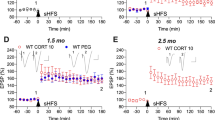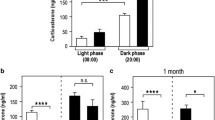Abstract
Oral pretreatment of mice with aldosterone or corticosterone blocked the memory-enhancing effects of piracetam, pramiracetam, aniracetam and oxiracetam in a dose-related manner, without, however, impairing the animals' learning performance. The improvement of memory induced by physostigmine, arecoline, and tacrine (THA) was similarly inhibited. The fact that elevated steroid levels suppress the memory-enhancing effects of entirely different substances could indicate that these substances have a common site of action. In the light of new observations showing increased cortisol concentrations in Alzheimer patients, this steroid dependency of the effects of memory enhancers might explain why only a limited number of these patients respond to therapy with nootropics or cholinomimetics.
Similar content being viewed by others
References
Abuzzahab FS, Merwin GE, Zimmermann RL, Sherman MC (1977) A double-blind investigation of piracetam vs placebo in geriatric memory. Pharmacopsychiatry 10:49–56
Banfi S, Dorigotti L (1986) Experimental behavioural studies with oxiracetam on different types of chronic cerebral impairment. Clin Neuropharmacol 9:19–26
Brown R, Kulik J (1977) Flashbulb memories. Cognition 5:73–99
Chouinard G, Annable L, Ross-Chouinard A, Olivier M, Fontaine F (1983) Piracetam in elderly psychiatric patients with mild diffuse cerebral impairment. Psychopharmacol Bull 81:100–106
Claus JJ, Ludwig C, Mohr E, Giuffra M, Blin J, Chase TN (1991) Nootropic drugs in Alzheimer's disease: symptomatic treatment with pramiracetam. Neurology 41:570–574
Cumin R, Bandle EF, Gamzu E, Haefely WE (1982) Effects of the novel compound aniracetam (Ro 13-5057) upon impaired learning and memory in rodents. Psychopharmacology 78:104–111
Dunnett CW (1955) A multiple comparison procedure for comparing several treatments with a control. J Am Statist Assoc 50:1096–1121
Dunnett CW (1964) New tables for multiple comparisons with a control. Biometrics 20:482–491
Fitten LJ, Perryman KM, Gross PL, Fine H, Cummins J, Marshall C (1990) Treatment of Alzheimer's disease with short- and long-term oral THA and lecithin: a double-blind study. Am J Psychiatry 147:239–242
Gehan EA (1980) A generalized Wilcoxon test for comparing arbitrarily single censored samples. Biometrika 52:203–53
Häusler A, Monnet G, Borer C, Bhatnagar A (1989) Evidence that corticosterone is not an obligatory intermediate in aldosterone biosynthesis. J Steroid Biochem 34:567–570
Hjörther A, Browne E, Jakobsen K, Viskum P, Gyntelberg F (1986) Organic brain syndrome treated with oxiracetam. Acta Neurol Scand 75:271–276
Kalbfleisch JDS, Prentice RL (1980) The statistical analysis of failure time data. Wiley, New York
Mangoni A, Perin C, Smirne S, Piccolo I, DeFilippi F, Marchetti C, Motta A, Monza GC (1988) A double-blind placebo-controlled study with oxiracetam in demented patients administered the Luria-Nebraska neuropsychological battery. Drug Dev Res 14:217–222
Martignoni E, Petraglia F, Costa A, Bono G, Genazzini AR, Nappi G (1990) Dementia of the Alzheimer type and hypothalamus-pituitary-adrenocortical axis: changes in cerebrospinal fluid corticotropin releasing factor and plasma cortisol levels. Acta Neurol Scand 81:452–456
Mondadori C, Häusler A (1990) Aldosterone receptors are involved in the mediation of the memory-improving effects of piracetam. Brain Res 524:203–207
Mondadori C, Petschke F (1987) Do piractam-like compounds act centrally via peripheral mechanisms? Brain Res 435:310–314
Mondadori C, Ducret T, Petschke F (1989) Blockade of the nootropic action of piractam-like nootropics by adrenalectomy: an effect of dosage? Behav Brain Res 34:155–158
Mondadori C, Bhatnagar A, Borkowski J, Häusler A (1990) Involvement of a steroidal component in the mechanism of action of piractam-like nootropics. Brain Res 506:101–108
Müller J (1988) Regulation of aldosterone biosynthesis. Physiological and biochemical aspects, 2nd rev edn. Springer, Berlin Heidelberg New York, p 5
Murray CL, Fibiger HC (1986) The effect of pramiracetam (CI 879) on the acquisition of a radial arm maze task. Psychopharmacology 89:378–381
Schneider LS (1990) Tetrahydroaminoacridine and lecithin for Alzheimer's disease. N Engl J Med 323:919
Sourander LB, Portin R, Mölsä P, Lahdes A, Rinne UK (1987) Senile dementia of the Alzheimer type treated with aniracetam, a new nootropic agent. Psychopharmacology 91:90–95
Weiskrantz L, Mondadori C (1991) MK 801 can facilitate passive avoidance memory when retention is not present in control animals, and can fail to facilitate, when it is present. Psychopharmacology 105:145–150
Wolthuis OL (1971) Experiment with UCB 6215, a drug which enhances acquisition in rats: its effects compared with those of methamphetamine. Eur J Pharmacol 16:283–297
Author information
Authors and Affiliations
Rights and permissions
About this article
Cite this article
Mondadori, C., Ducret, T. & Häusler, A. Elevated corticosteroid levels block the memory-improving effects of nootropics and cholinomimetics. Psychopharmacology 108, 11–15 (1992). https://doi.org/10.1007/BF02245278
Received:
Revised:
Issue Date:
DOI: https://doi.org/10.1007/BF02245278




